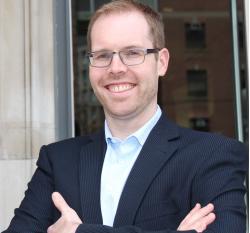Dr. Pugh uses the latest tools in genomics to improve immune-based cancer therapies. He is one 16 speakers that will present at the GSC’s 20th Anniversary Symposium, November 21, 2019.
 When Dr. Trevor Pugh began working at the GSC as a co-op student pursuing an undergraduate degree in biochemistry, the advances in technology and computational biology drew him in to the field of genomics.
When Dr. Trevor Pugh began working at the GSC as a co-op student pursuing an undergraduate degree in biochemistry, the advances in technology and computational biology drew him in to the field of genomics.
“It was the technology that really drew me in,” says Dr. Pugh, “But what made me stay was the application of computational tools to clinical research.”
Dr. Pugh decided to remain at the GSC for graduate school where he obtained his PhD in medical genetics under the supervision of Dr. Marco Marra. He had the opportunity to work at the intersection between technology and clinical research, collaborating closely with Dr. Janessa Laskin to sequence lung tumour biopsies.
“The GSC provided the perfect mix of computational tools, technology and clinical experience,” says Dr. Pugh.
As a postdoctoral fellow at the Dana-Farber Cancer Institute and the Broad Institute of Harvard and MIT, Dr. Pugh led landmark cancer genome studies published in high impact journals including Nature, Cell and Nature Genetics. During this time, he also completed a clinical laboratory fellowship at the Harvard Medical School Genetics Training Program.
Dr. Pugh is now a board-certified molecular geneticist and holder of the Canada Research Chair in Translational Genomics. He is an Associate Professor at the University of Toronto Department of Medical Biophysics, Senior Scientist at the Princess Margaret Cancer Centre and Director of Genomics and Senior Investigator at the Ontario Institute for Cancer Research. Recently, he was awarded a Terry Fox New Investigator Award and a StandUp2Cancer Phillip A. Sharp Innovation in Collaboration Award.
Dr. Pugh’s current research is focused on understanding the clinical implications of clonal shifts in cancer and non-cancerous cell populations during treatment, most recently using cell-free DNA, single cell RNA sequencing analysis and immune repertoire profiling.
At the GSC’s upcoming 20th anniversary symposium, Dr. Pugh is looking forward to hearing about the recent advances made by his former GSC alumni, colleagues and collaborators.
“The GSC provided an excellent training environment,” says Dr. Pugh, “Many former GSC trainees have gone on to do great things. I am looking forward to hearing about them.”